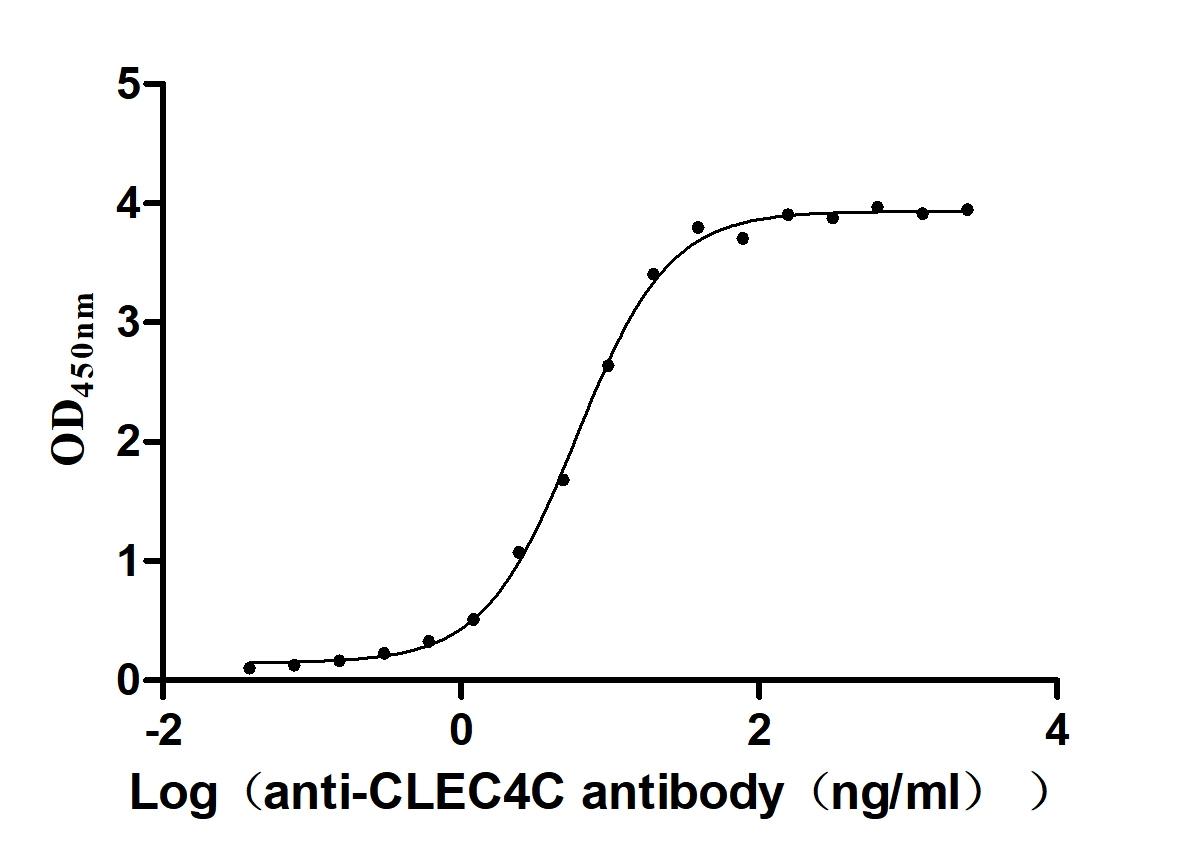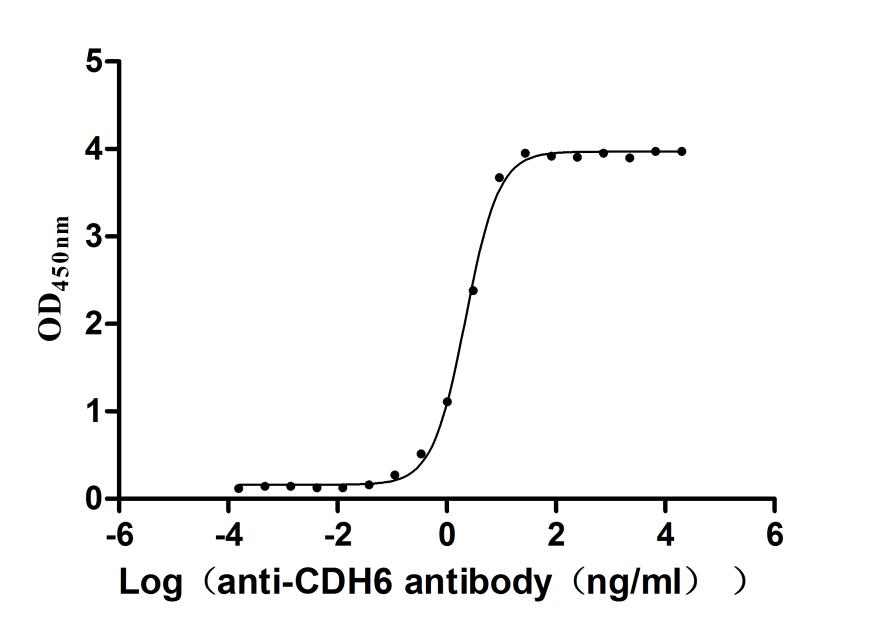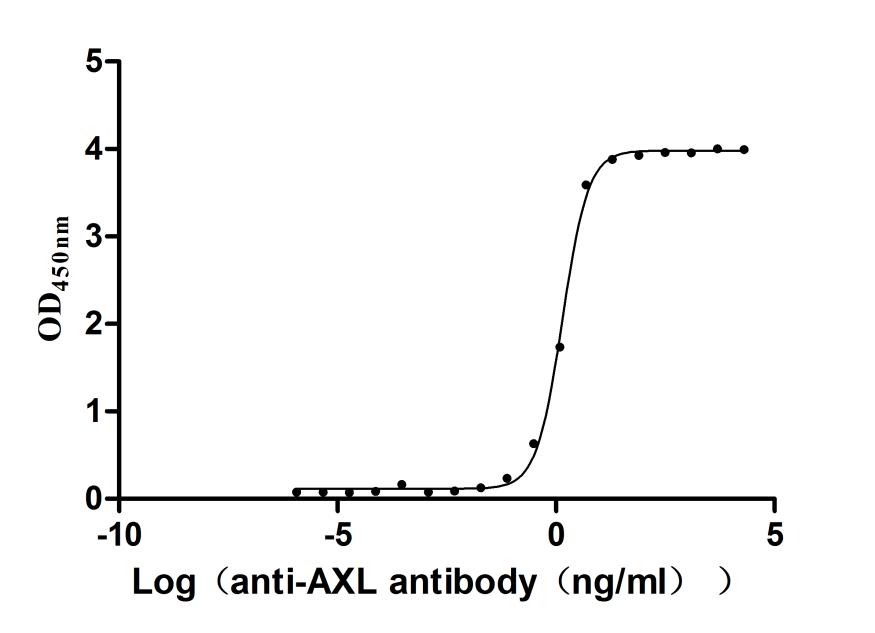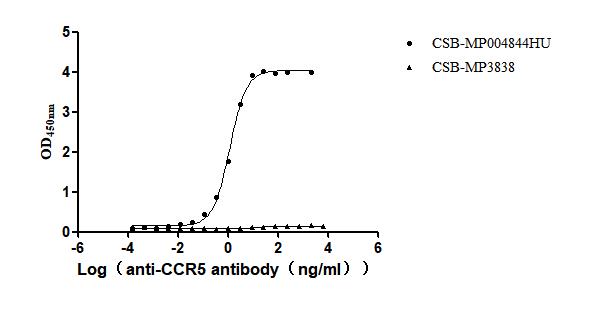Recombinant Human Beta-adrenergic receptor kinase 1 (ADRBK1), partial
-
货号:CSB-YP001394HU1
-
规格:
-
来源:Yeast
-
其他:
-
货号:CSB-EP001394HU1
-
规格:
-
来源:E.coli
-
其他:
-
货号:CSB-EP001394HU1-B
-
规格:
-
来源:E.coli
-
共轭:Avi-tag Biotinylated
E. coli biotin ligase (BirA) is highly specific in covalently attaching biotin to the 15 amino acid AviTag peptide. This recombinant protein was biotinylated in vivo by AviTag-BirA technology, which method is BriA catalyzes amide linkage between the biotin and the specific lysine of the AviTag.
-
其他:
-
货号:CSB-BP001394HU1
-
规格:
-
来源:Baculovirus
-
其他:
-
货号:CSB-MP001394HU1
-
规格:
-
来源:Mammalian cell
-
其他:
产品详情
-
纯度:>85% (SDS-PAGE)
-
基因名:
-
Uniprot No.:
-
别名:ADRBK1; Adrenergic beta receptor kinase 1; ARBK1_HUMAN; BARK; BARK1; Beta adrenergic receptor kinase 1; Beta ARK 1; Beta ARK1; Beta-adrenergic receptor kinase 1; Beta-ARK-1; FLJ16718; G protein coupled receptor kinase 2; G-protein coupled receptor kinase 2; GRK2
-
种属:Homo sapiens (Human)
-
蛋白长度:partial
-
表达区域:2-221
-
氨基酸序列ADLEAVLADVSYLMAMEKSKATPAARASKKILLPEPSIRSVMQKYLEDRGEVTFEKIFSQKLGYLLFRDFCLNHLEEARPLVEFYEEIKKYEKLETEEERVARSREIFDSYIMKELLACSHPFSKSATEHVQGHLGKKQVPPDLFQPYIEEICQNLRGDVFQKFIESDKFTRFCQWKNVELNIHLTMNDFSVHRIIGRGGFGEVYGCRKADTGKMYAMKC
-
蛋白标签:Tag type will be determined during the manufacturing process.
The tag type will be determined during production process. If you have specified tag type, please tell us and we will develop the specified tag preferentially. -
产品提供形式:Lyophilized powder
Note: We will preferentially ship the format that we have in stock, however, if you have any special requirement for the format, please remark your requirement when placing the order, we will prepare according to your demand. -
复溶:We recommend that this vial be briefly centrifuged prior to opening to bring the contents to the bottom. Please reconstitute protein in deionized sterile water to a concentration of 0.1-1.0 mg/mL.We recommend to add 5-50% of glycerol (final concentration) and aliquot for long-term storage at -20℃/-80℃. Our default final concentration of glycerol is 50%. Customers could use it as reference.
-
储存条件:Store at -20°C/-80°C upon receipt, aliquoting is necessary for mutiple use. Avoid repeated freeze-thaw cycles.
-
保质期:The shelf life is related to many factors, storage state, buffer ingredients, storage temperature and the stability of the protein itself.
Generally, the shelf life of liquid form is 6 months at -20°C/-80°C. The shelf life of lyophilized form is 12 months at -20°C/-80°C. -
货期:Delivery time may differ from different purchasing way or location, please kindly consult your local distributors for specific delivery time.Note: All of our proteins are default shipped with normal blue ice packs, if you request to ship with dry ice, please communicate with us in advance and extra fees will be charged.
-
注意事项:Repeated freezing and thawing is not recommended. Store working aliquots at 4°C for up to one week.
-
Datasheet :Please contact us to get it.
相关产品
靶点详情
-
功能:Specifically phosphorylates the agonist-occupied form of the beta-adrenergic and closely related receptors, probably inducing a desensitization of them. Key regulator of LPAR1 signaling. Competes with RALA for binding to LPAR1 thus affecting the signaling properties of the receptor. Desensitizes LPAR1 and LPAR2 in a phosphorylation-independent manner. Positively regulates ciliary smoothened (SMO)-dependent Hedgehog (Hh) signaling pathway by facilitating the trafficking of SMO into the cilium and the stimulation of SMO activity. Inhibits relaxation of airway smooth muscle in response to blue light.
-
基因功能参考文献:
- M3R activation-induced GRK2 recruitment is Ggamma subtype dependent in which Gbetagamma dimers with low cell membrane-affinity Ggamma9 exhibited a two-fold higher GRK2-recruitment compared to high affinity Ggamma3 expressing cells. PMID: 29864421
- Chronic/pathologic GPCR signaling elicits the interaction of the G-protein Gbetagamma subunit with GPCR kinase 2 (GRK2), targeting the receptor for internalization, scaffolding to pathologic signals, and receptor degradation. Targeting this pathologic Gbetagamma-GRK2 interaction has been suggested as a possible strategy for the treatment of HF. PMID: 28130200
- A novel regulatory role of GRK2 was proposed for the ubiquitination of beta-arrestin in the context of the PKC-mediated heterologous regulation of GPCRs. PMID: 29054428
- eIF3d promotes gallbladder cancer (GBC) progression mainly via eIF3d-GRK2-AKT axis and it may be used as a prognostic factor. The therapeutic targeting of eIF3d-GRK2 axis may be a potential treatment approach for GBC. PMID: 28594409
- KHSV miR-K3 activates the GRK2/CXCR2/AKT axis inducing KSHV-induced angiogenesis and promoting KSHV latency. PMID: 27058419
- Compared to the original peptide, a modified peptide (Ac-EEMEFSEAEANMN-NH2) exhibited markedly higher affinity for GRK2, but very low affinity for GRK5, suggesting that it can be a sensitive and selective peptide for GRK2 PMID: 27714516
- Low grk2 expression is associated with lung metastasis in gastric cancer. PMID: 28843497
- Lowering the level of cellular FLNA caused an elevation in RalA activity and resulted in selective interference with the normal intracellular trafficking and signaling of D2R through GRK2. PMID: 27188791
- Results demonstrate that GPR3 signals at the plasma membrane and can be silenced by GRK2/beta-arrestin overexpression. These results also strongly implicate the serine and/or threonine residues in the third intracellular loop in the regulation of GPR3 activity. PMID: 23826079
- GRK2 is negatively related to IGF1R and IGF1R, but not GRK2, was associated with the tumour-node-metastasis stage and overall and disease-free survival in hepatocellular carcinoma. PMID: 28202495
- The tyrosine-phosphorylated GRK2 mediates this inhibition by acting on the second intracellular loop of D3R. PMID: 28579429
- GRK2 is overexpressed in pancreatic cancer, and might serve as a potential indicator of unfavorable prognosis. PMID: 27346572
- Data, including data from studies in heterozygous knockout mice, suggest that GRK2 is involved in TNFalpha-induced wound healing in epithelial cells of the colon; GRK2 appears to inhibit TNFalpha-induced apoptosis; GRK2 inhibits TNFalpha-induced ERK activation by inhibiting generation of reactive oxygen species. Homozygous knockout of GRK2 is embryonically lethal in mice. PMID: 28572156
- The dominant model (CC vs. CT+TT) of rs1894111 polymorphism in the ADRBK1 gene might be associated with low-renin hypertension in Han Chinese. PMID: 27555048
- Our data suggest that GRK2 acts as an important onco-modulator by strengthening the functionality of key players in breast tumorigenesis such as HDAC6 and Pin1. PMID: 27720394
- GRK2 may inhibit IGF1-induced human hepatocellular carcinoma cell growth and migration through downregulation of EGR1. PMID: 26936374
- It is a critical factor in diabetic endothelial dysfunction and plays a role in many physiological functions including regulation of G-protein-coupled receptors (GPCRs). (review) PMID: 26234354
- Suggest role for GRK2 in the regulating cardiac hypertrophy. PMID: 26224342
- the dual-specific GRK2 and ERK cascade inhibitor, RKIP (Raf kinase inhibitor protein), triggered dysfunctional cardiomyocyte energetics and the expression of heart failure-promoting Pparg-regulated genes. PMID: 26670611
- Acute mental stress significantly increased GRK2 density in in peripheral blood mononuclear cells of young adult males. PMID: 26706289
- It plays a role in progression of Vasculature which is affected by insulin resistance and type 2 diabetes expresses high levels of GRK2 PMID: 26447102
- Data suggest that, by targeting/repressing GRK2, microRNA-K3 of Kaposi sarcoma-associated herpesvirus (KSHV) facilitates migration and invasion of vascular endothelial cells via activation of CXCR2/AKT signaling. PMID: 26402907
- Acute aerobic exercise induces a greater GRK2 expression in women than men, while increased cardiorespiratory fitness is associated with exercise-induced GRK2 expression in PBMCs PMID: 26092485
- G protein beta subunits (Gb) bind to DDB1 and Gb2 targets GRK2 for ubiquitylation by the DDB1-CUL4A-ROC1 ubiquitin ligase. PMID: 25982117
- A thorough understanding of the functions of GRK2 in the heart is necessary in order to finalize it as a candidate for drug development. PMID: 24702056
- Knockdown of ADRBK1 gene has detrimental effects on breast cancer cell growth. PMID: 25279970
- Results uncovered that Gaq binding to GRK2 enhances the recruitment of GRK2 to M3-ACh receptors. PMID: 25316767
- These data demonstrate that GRK2 modulates FcinRI signaling in mast cells via at least two mechanisms.One involves GRK2-RH and modulates tyrosine phosphorylation of Syk, and the other is mediated via the phosphorylation of p38 and Akt. PMID: 24904059
- Data indicate that residues on the G-protein coupled receptor kinase 2 (GRK2) N terminus and kinase domain extension collaborate to create a G protein-coupled receptor (GPCR) docking site. PMID: 25049229
- Low levels of GRK2/GRK5 causes a slow and not complete desensitization/down-regulation of GPR17. PMID: 24613411
- GRK2 is localized to centrosomes and plays a central role in mitogen-promoted centrosome separation. PMID: 23904266
- The gene expression levels of TREM1 in PMNs isolated from patients with bacterial infections may be used as a surrogate biomarker for determining the severity. PMID: 24465168
- Changes in lymphocyte GRK2 after exercise training can strongly predict outcome in advanced heart failure. PMID: 23689525
- This review discusses recently discovered roles of GRK2 as a biomarker in cardiomyocyte metabolism and myocardial contraction. PMID: 24812353
- decreased endothelial Grk2 dosage accelerated tumor growth, along with reduced pericyte vessel coverage and enhanced macrophage infiltration, and this transformed environment promoted decreased GRK2 in breast cancer vessels PMID: 24135140
- This study showed that, among GRK2, beta-arrestin 1, and beta-arretin 2, beta-arrestin 1 and GRK2 seem to have a role in modulating GH secretion during somatostatin analog treatment. PMID: 24169548
- Desensitization and internalization of endothelin receptor A: impact of G protein-coupled receptor kinase 2 (GRK2)-mediated phosphorylation. PMID: 24064210
- Data indicate that CXCL12-induced phosphorylation at CXCR4 S346/347 was mediated by GRK2/3. PMID: 23734232
- GRK2 takes part in the regulation of the initial inflammatory response during mycobacterial infection. PMID: 23312955
- We further detected that reduced level of GRK2 induced a small cell cycle arrest at G2/M phase by enhancing the expression of cyclin A, B1, and E PMID: 23460259
- Data suggest that specific serine/threonine residues in DRD2 (dopamine receptor D2) are involved in regulation of DRD2 endocytosis by GRK2 and GASP1 (G protein-coupled receptor associated sorting protein 1). PMID: 23082996
- Gene transfer of human GRK2 inhibitory peptide preserved regional/global systolic function after acute MI without arresting progressive ventricular remodeling. PMID: 23208013
- This study identify that GRK2 as a potential molecular link between inflammation and mGluR-mediated sensitization. PMID: 23494575
- this study provides evidence that GRK2 mediates phosphorylation-independent mGluR5 desensitization via the interaction between the RGS domain and Galphaq in HEK 293 cells. PMID: 23705503
- Increased localization is seen in heart mitochondria from cardiac-specific GRK2 transgenic mice compared with normal littermate controls. PMID: 23467820
- GRK2 dynamically associates with and phosphorylates HDAC6 to stimulate its alpha-tubulin deacetylase activity at specific cellular localizations such as the leading edge of migrating cells, thus promoting local tubulin deacetylation and enhanced motility. PMID: 23076141
- Persistent hyperalgesia in GRK2-deficient mice is associated with an increase in spinal cord microglia/macrophages. PMID: 22731384
- Inhibition of G-protein-coupled receptor kinase 2 (GRK2) triggers the growth-promoting mitogen-activated protein kinase (MAPK) pathway PMID: 23362259
- a novel role for IL-8 in inhibiting betaAR agonist-stimulated alveolar epithelial fluid transport via GRK2/PI3K-dependent mechanisms. PMID: 23221335
- These data suggest cell type- and subcellular compartment-dependent differences in GRK/arrestin-mediated desensitization and signaling. PMID: 23139825
显示更多
收起更多
-
亚细胞定位:Cytoplasm. Cell membrane.
-
蛋白家族:Protein kinase superfamily, AGC Ser/Thr protein kinase family, GPRK subfamily
-
组织特异性:Expressed in peripheral blood leukocytes.
-
数据库链接:
HGNC: 289
OMIM: 109635
KEGG: hsa:156
STRING: 9606.ENSP00000312262
UniGene: Hs.83636
Most popular with customers
-
Recombinant Human Intestinal-type alkaline phosphatase (ALPI) (Active)
Express system: Mammalian cell
Species: Homo sapiens (Human)
-
Recombinant Mouse Tyrosine-protein kinase Mer (Mertk), partial (Active)
Express system: Mammalian cell
Species: Mus musculus (Mouse)
-
Recombinant Macaca fascicularis C-type lectin domain family 4 member C(CLEC4C), partial (Active)
Express system: Mammalian cell
Species: Macaca fascicularis (Crab-eating macaque) (Cynomolgus monkey)
-
Recombinant Macaca fascicularis Cadherin 6(CDH6),partial (Active)
Express system: Mammalian cell
Species: Macaca fascicularis (Crab-eating macaque) (Cynomolgus monkey)
-
Recombinant Human Tyrosine-protein kinase receptor UFO(AXL),partial (Active)
Express system: Mammalian cell
Species: Homo sapiens (Human)
-
Recombinant Human C-C chemokine receptor type 5 (CCR5)-VLPs (Active)
Express system: Mammalian cell
Species: Homo sapiens (Human)


















